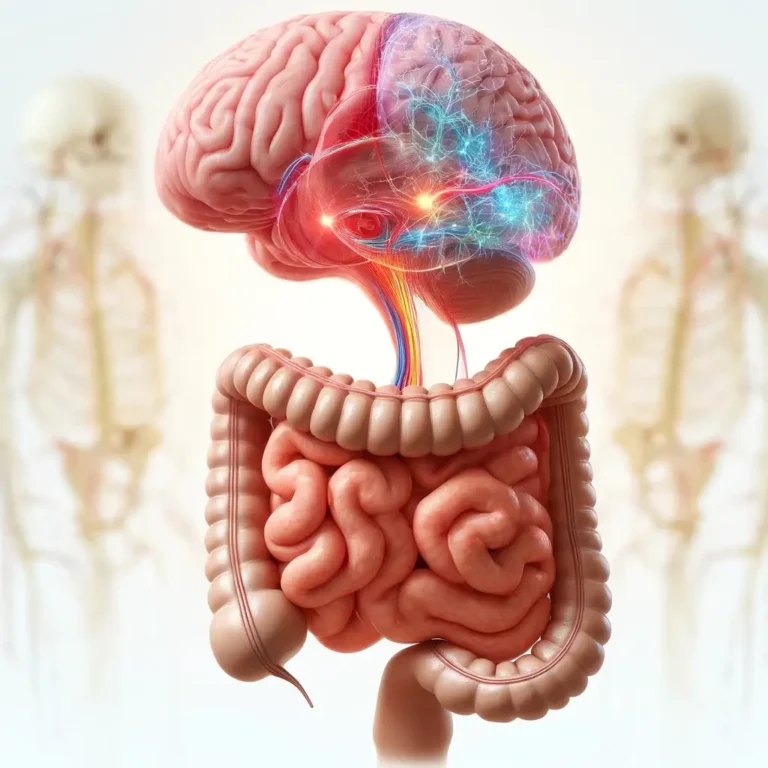Gut Health
Book Your Gut Health Consultation Today
The Gut-Brain Connection
Why a Healthy Gut is Key to Your Overall Wellbeing
A healthy gut is essential for overall health and wellbeing. The gut is often referred to as the ‘second brain’ due to its essential role in regulating not only digestion but also mental health, immune function and overall wellbeing. Poor gut health can lead to various symptoms and even long-term health problems, both physically and mentally.
Signs of Poor Gut Health
- Digestive issues (bloating, constipation, diarrhea).
- Stomach discomfort.
- Food intolerances or sensitivities.
- Low energy or chronic fatigue.
- Frequent illness.
- Chronic inflammation.
- Sleep issues.
- Unexplained weight gain or difficulty losing weight.
- Mental health challenges (anxiety, depression, brain fog).
Common conditions
- Irritable Bowel Syndrome (IBS)
- Irritable Bowel Disease (IBD)
- Crohn’s Disease
- Colitis


Gut-Brain Axis
The gut-brain axis refers to the bidirectional communication between the gut and the brain. This communication system plays a crucial role in maintaining overall health. Disruptions in the system can cause a variety of issues ranging from digestive disorder to mental health conditions like stress, anxiety and depression.
The Vagus Nerve: Bridging the Gut-Brain Connection for Better Health
The vagus nerve plays a pivotal role in the gut-brain axis, facilitating bidirectional communication between the gut and the brain. This neural pathway influences physical and mental health by transmitting sensory and motor signals about digestion, immune function and emotional states.
Stress or anxiety can decrease vagal tone, leading to slowed digestion and causing issues like bloating or constipation. Low vagal tone has been linked to conditions such as anxiety, depression and PTSD. Functional gastrointestinal (GI) disorders like IBS are often associated with dysfunction in vagal tone.
The Link Between Trauma and IBS: How Psychological Stress Affects Gut Health
Trauma is strongly associated with the development and persistence of IBS through its effects on the gut-brain axis, stress response, immune system and the body’s physiological processes.
Studies show that individuals with IBS report higher rates of adverse childhood experiences (AECs) and early-life trauma compared to those without IBS.
Research has consistently showed the connection between PTSD and IBS, suggesting that trauma, particularly psychological trauma, contributes to the onset and exacerbation of IBS symptoms.
Treating the psychological trauma alongside IBS can improve overall outcomes for trauma survivors.
‘Gut‐focused hypnotherapy is highly effective in functional gastrointestinal disorders when conventional treatments have failed’
Irritable Bowel Syndrome (IBS)
What is Irritable Bowel Syndrome (IBS)
Irritable bowel syndrome (IBS) is a common gastrointestinal (GI) disorder that affects many. According to clinical studies, 1 in 5 Australians suffer from symptoms of IBS, making it the most commonly diagnosed GI condition. Symptoms of IBS include abdominal pain or cramps, bloating, excess gas, mucus in the stool changes in bowel habits like constipation, diarrhea or alternating between both. Other symptoms may include feeling tired, feeling sick, headaches, backache and loss of appetite.
The exact cause of IBS is not known; however, several factors are thought to contribute, such as gut-brain interaction, abnormal gut flora, stress, anxiety, depression and trauma.
Scientific Treatment Protocol for Irritable Bowel Syndrome (IBS)
Dr. Olafur Palsson, based in the USA, is a professor of medicine and clinical psychologist with a strong interest in Disorders of Gut-Brain Interaction (DGBI). An internationally recognised expert in the use of hypnosis for gastrointestinal disorders, Dr. Palsson has developed a hypnosis treatment protocol for treating irritable bowel syndrome (IBS). Dr. Palsson has permitted his scripted work for practitioners with training and experience in clinical hypnosis and who he believes can deliver his work successfully.
The Treatment
The IBS treatment protocol involves seven one-hour sessions. Each session is delivered biweekly (every 2 weeks and no longer than 3 weeks). Clients are provided with a recording to listen to daily in between sessions.
Supplementary Strategies
EFT (Emotional Freedom Techniques) can help reduce the severity of IBS symptoms by addressing the emotional factors associated to the gastrointestinal distress. Studies have shown EFT to be a promising intervention for individuals whose symptoms are closely linked to emotional distress, stress and trauma.

Some Happy Clients
Frequently Asked Questions
Can hypnotherapy work for all types of IBS?
Yes, hypnotherapy has been shown to be effective for all types of IBS – diarrhea, constipation and mixed IBS.
Is there scientific support for the use of hypnotherapy for IBS?
Yes, there is scientific evidence supporting the effectiveness of hypnotherapy for IBS. Dr. Palsson and other researchers have contributed significantly to the research and evidence supporting hypnotherapy as an effective treatment for IBS.
Can hypnotherapy be used for gastrointestinal (GI) conditions other than IBS?
Yes, hypnotherapy can be highly effective in managing GI conditions such as inflammatory bowel disease (IBD) and gastroesophageal reflux disease (GERD). Hypnotherapy can help managing stress and emotional triggers that may worsen the condition. It can also help to manage the pain associated with GI conditions.
Ready to Embrace Change?

